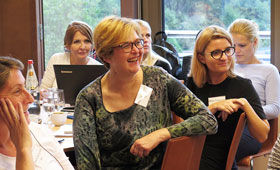Serbia creates the legal basis for dual vocational training
At the end of 2017, Serbia passed a law on dual vocational training. The law is a first step towards a dual VET system. More about this in the GIZ guest article.

In November 2017, the Serbian parliament adopted the Law on Dual Education after one year of intensive negotiation and consulting processes, which were actively supported by the German Development Cooperation on behalf of the BMZ through the project “Reform of Vocational Education and Training”. The law was initiated by the Serbian Chamber of Commerce and Industry recognizing early the relevance of vocational education to secure skilled labour within the country. The Serbian Ministry of Education, Science and Technological Development, the main implementing partner of the VET project, engaged ambitiously into joint efforts with the chamber resulting in a fast development of the required legal framework.
The law is a first step towards a dual vocational education and training system. Although, it differs in central aspects from the dual system in the German speaking countries: The adolescents remain students of the secondary schools, who are going for practical training to the companies, hence they are not apprentices of the company they are trained in; Furthermore, in the Serbian context it was crucial, that in-company training is realized as „work-based learning“, not work.
In detail, the legal framework states that all companies involved in the dual education system need at least one licenced instructor, who will be certified by the chamber. Companies have to cover the training costs for the instructor. Preconditions which a company has to fulfil in order to be allowed to take on students for practical training, will be defined. The chamber is responsible to assess, if companies meet the basic requirements to serve as a training provider. Contracts will be set up between schools and companies as well as between companies and students, which will specify the content and conditions of work-based learning. Work-based learning can take place in one or several companies. In company training shall not exceed 6 hours per day, resulting in a maximum of 30 hours per week. There will be a financial compensation of at least 70 per cent of the minimum wage paid to the students for the time spend in the companies. Furthermore, the companies have to cover all costs for a) security clothing and equipment, b) transportation expenses, c) food and d) casualty insurance. Career guidance and counselling will be introduced in vocational schools. There will be a practical final examination with the involvement of the private sector. The chamber will nominate examiners. Details of the final exam are determined by the respective curricula. Companies and business associations are included into the process of curricula development.
Many listed aspects largely reflect on the experiences gained by the project Reform of Vocational Education and Training since 2013, when starting to introduce dual elements into the technical vocational education and training of selected 3-year profiles. Since 2015, with the support of the project, instructors of cooperating companies have been trained and companies are involved in the development of curricula and of final exams. Several companies are already paying students voluntarily a type of pocket money as a symbolic compensation for their work.
The law will enter into force at the beginning of the school year 2019/2020. In the next months, respective implementing regulations and internal directives for the chamber have to be developed. Hereby, the Serbian institutions continue to receive support from the TVET project, in order to create the necessary basis for a successful start into the implementation phase of the newly adopted law.
GOVET supports Serbia in reforming its vocational training. In November 2017, GOVET has organized an expert dialogue at BIBB. Representatives of the Serbian Institute for the Improvement of Education discussed with VET experts from BIBB about the development of standards and certification / examinations.